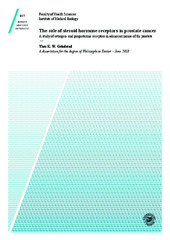| dc.contributor.advisor | Elin, Richardsen | |
| dc.contributor.author | Grindstad, Thea Karoline Walstad | |
| dc.date.accessioned | 2018-08-14T12:25:53Z | |
| dc.date.available | 2018-08-14T12:25:53Z | |
| dc.date.issued | 2018-06-15 | |
| dc.description.abstract | Steroid hormones and their receptors are vital for numerous physiological processes in the human body, but also related to the development of several malignancies. One such receptor strongly associated with prostate cancer, is the androgen receptor. Other steroid hormone receptors are also implicated in prostate cancer, their role, however, remains to be defined. Using immunohistochemistry and tissue microarray technology, we sought to examine the tissue distribution of a selection of steroid hormone related biomarkers in radical prostatectomy specimens from our cohort of 535 prostate cancer patients. Further, we investigated the association with marker expression and patient outcome. The included biomarkers were the progesterone receptor and its isoforms, A and B, the estrogen receptor- alpha and beta and aromatase, the enzyme converting androgens to estrogen. In prostate cancer, a great challenge remains in separating patients with indolent disease from those with an aggressive cancer. This has motivated the search for prognostic biomarkers that can aid patients risk stratification and guide treatment decisions. In our research, a significant and independent prognostic value was observed for all investigated biomarkers. Based on these observations, we propose a role of these steroid hormone related receptors and enzyme in the pathogenesis of prostate cancer. With further validation, they could have potential as prognostic biomarkers, and possibly a value in future prostate cancer treatment. | en_US |
| dc.description.doctoraltype | ph.d. | en_US |
| dc.description.popularabstract | Today, Prostate cancer is the most frequent occurring cancer amongst men in Norway.
The dilemma with prostate cancer is that it can develop in several ways. It can remain "silent", never giving the patient any complaints, and the patient will eventually die from other causes that the disease. Or it can be an aggressive cancer; quickly spreading and greatly affecting the patient's life quality, eventually resulting in death. So far, no optimal way to predict how the specific prostate cancer will develop has been discovered. We sought to bring insight to this subject by investigating the influence of specific steroid hormone receptors on prostate cancer progression. Steroid hormones constitute an important signaling system in the human body. They do their job by stimulating their own receptors, located in cells throughout the whole body. This is similar to a key in a lock, where the key is the hormone and the lock the receptor. Several of such steroid hormone receptors are connected to cancers. We evaluated the receptors' presence in prostate cancers that had been surgically removed, in addition to evaluating how the patient's cancer had developed. Our discoveries indicate that these receptors can predict how the prostate cancer will progress. This knowledge can improve risk groups for prostate cancer patients, which in turn can benefit treatment decisions. | en_US |
| dc.description.sponsorship | The studies in this thesis have been supported by grants from the Northern Norway Regional Health Authority (Helse Nord- HF). Funding number 30125/30012. The funders had no role in study design, data collection and analysis, decision to publish, or preparation of the manuscripts | en_US |
| dc.identifier.uri | https://hdl.handle.net/10037/13399 | |
| dc.language.iso | eng | en_US |
| dc.publisher | UiT The Arctic University of Norway | en_US |
| dc.publisher | UiT Norges arktiske universitet | en_US |
| dc.rights.accessRights | openAccess | en_US |
| dc.rights.holder | Copyright 2018 The Author(s) | |
| dc.rights.uri | https://creativecommons.org/licenses/by-nc-sa/3.0 | en_US |
| dc.rights | Attribution-NonCommercial-ShareAlike 3.0 Unported (CC BY-NC-SA 3.0) | en_US |
| dc.subject | VDP::Medisinske Fag: 700::Klinisk medisinske fag: 750::Onkologi: 762 | en_US |
| dc.subject | VDP::Medical disciplines: 700::Clinical medical disciplines: 750::Oncology: 762 | en_US |
| dc.subject | VDP::Medisinske Fag: 700::Basale medisinske, odontologiske og veterinærmedisinske fag: 710::Medisinsk molekylærbiologi: 711 | en_US |
| dc.subject | VDP::Medical disciplines: 700::Basic medical, dental and veterinary science disciplines: 710::Medical molecular biology: 711 | en_US |
| dc.title | The role of steroid hormone receptors in prostate cancer.
A study of estrogen- and progesterone receptors in adenocarcinoma of the prostate | en_US |
| dc.type | Doctoral thesis | en_US |
| dc.type | Doktorgradsavhandling | en_US |


 English
English norsk
norsk








